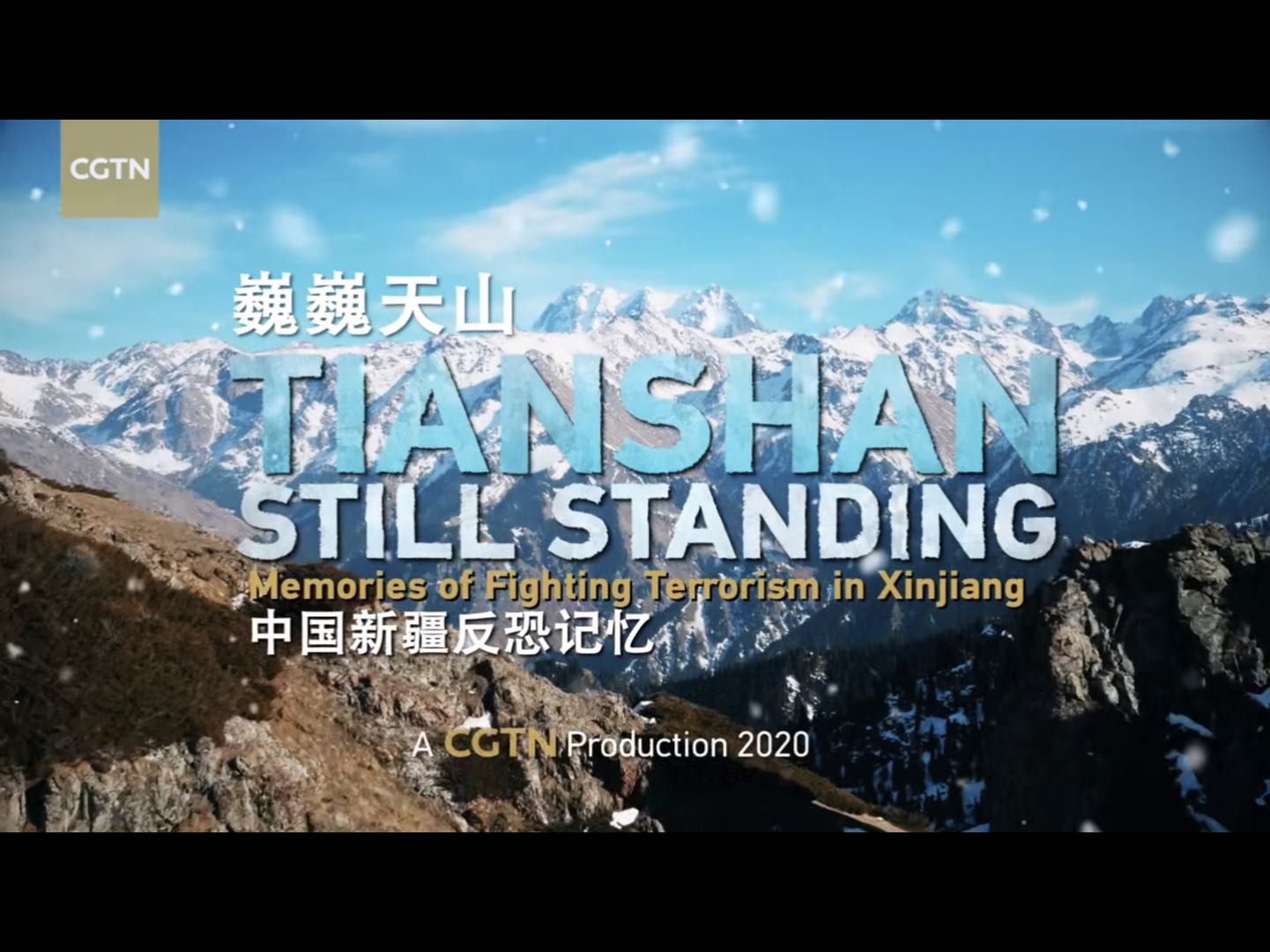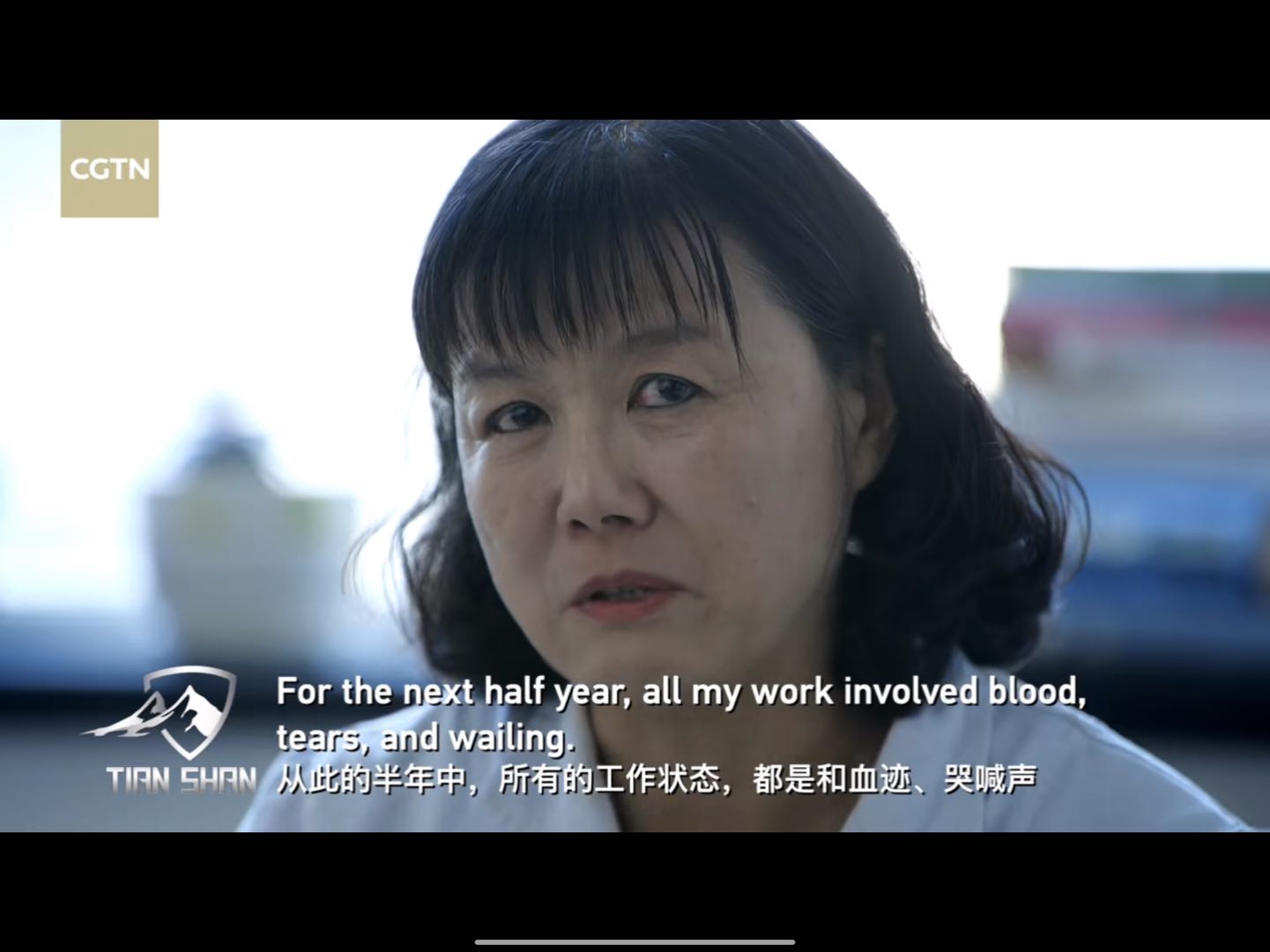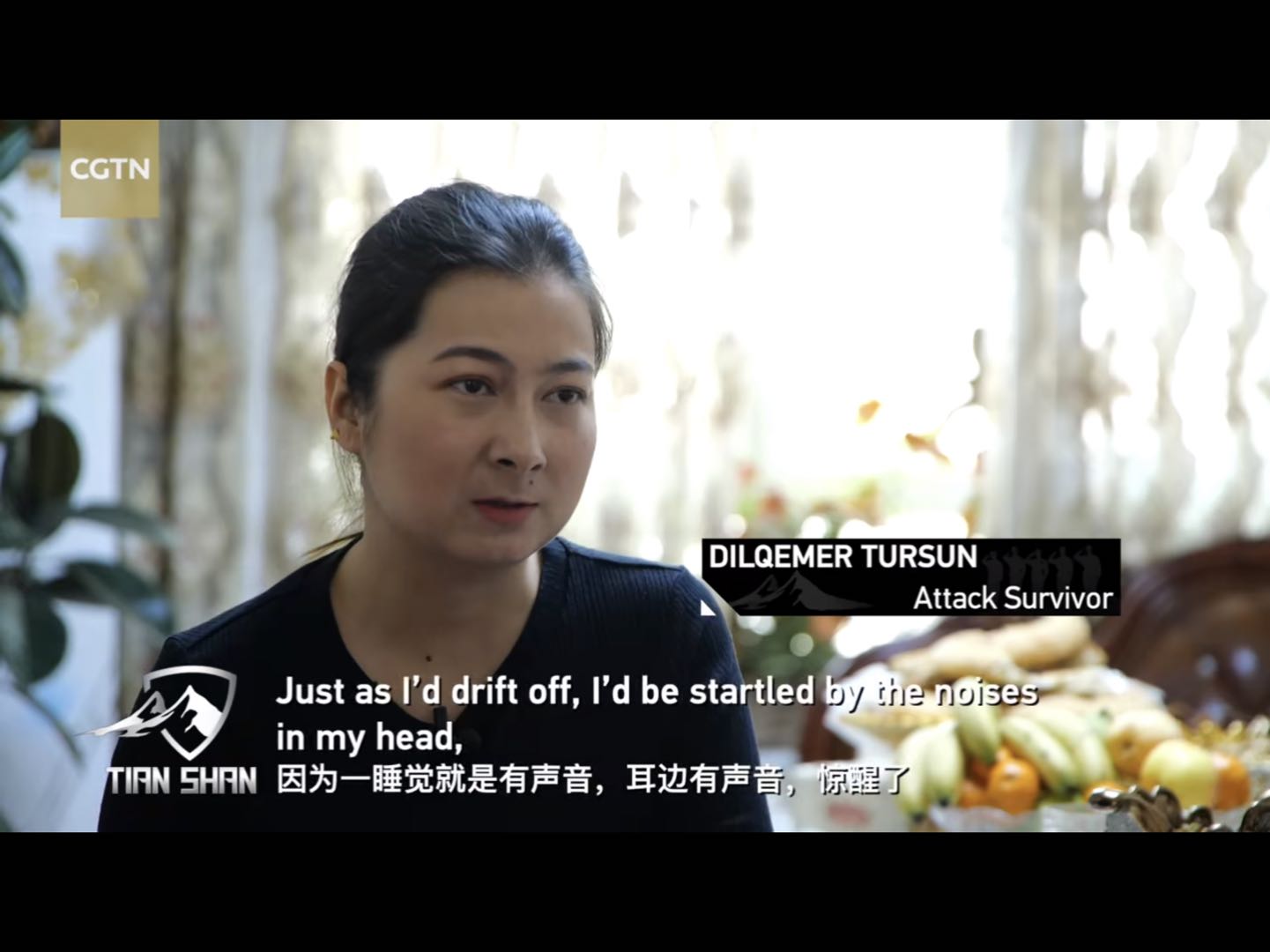


China released on Friday an English-language documentary illustrating the brutal nature of the terrorist attacks and the relentless efforts made by locals to tackle terrorism in Northwest China’s Xinjiang Uyghur Autonomous Region. The documentary featured never seen before first-hand footage of bloody attacks and testimonies of victims, uncovering the disturbing truth behind the so-called religious freedom and human rights that some Western countries have been advocating.
Titled “Tianshan: Still Standing - Memories of Fighting Terrorism in Xinjiang”, the documentary was the third episode in a series by CGTN on Xinjiang’s anti-terrorism efforts. The first two episodes had already attracted a great deal of public attention, receiving millions of views and sparking debate on social media platforms worldwide.
After it was aired, the new episode quickly drew positive reactions from netizens worldwide, with many commenting that the authentic images of the terrorists’ cruelty strengthened their belief that terrorism has no boundaries, and such evil actions should not be condoned under any circumstances, or used for political purposes.
As was the case for the first two documentaries, major Western media outlets, which have a strong tendency to criticize China’s Xinjiang policies and exaggerate the issue in their reports, remained silent as of press time, with many Chinese experts noting that they only choose to report what fits their interests and ideological slants and always ignore the truth about Xinjiang.
Lingering trauma
The documentary released on Friday comes in four parts and tells viewers about China’s most direct security threat - terrorism. It features accounts from police and victims of several terrorist attacks who tell of lingering traumas that have yet to heal, even decades on.
Many SWAT team members have sacrificed their lives to protect the innocent in the battle against terrorism, leaving their loved ones mourning unbearable losses. Xudaberdi Toxti, a policeman fighting ETIM in Zepu County, was tortured and murdered by terrorists in front of his family 20 years ago. The brutal memory has haunted Toxi’s daughter Peridem for her entire life, even forcing her to abandon the old family house and move to the city to escape the painful memories.
“Their leader yelled, ‘Cut his hands, cut his legs’. My father was cut up with over 30 slashes on his body, and his body was in pieces,” said the devastated daughter, who added that she used to feel faint when she saw people wearing red, as it reminded her of blood.
Murat Sheripjan, deputy director general of the Hotan Public Security Department, spoke of his years of experience fighting terrorism, calling it “a life-and-death struggle.”
Even religious leaders have been brutally murdered by terrorists in the name of “religious freedom”. On July 30, 2014, Jume Tayir, the religious leader of the Id Kah Mosque in Kashgar, was hacked to death by terrorists. Memet June, who took over from his father and became the new Imam of Id Kah Mosque, said that terrorists have abused “religious freedom” to achieve their despicable purpose of separating China.
“Islam is a faith that promotes solidarity and peace. It particularly opposes harming innocent lives. This is how the criminals have twisted Islamic teachings,” he said.

Xia Yeling, doctor
The trauma of terrorism has shattered the lives of many ordinary people, who have since been living in constant fear and pain. Xia Yeling, a psychologist who provides counselling to victims of riots in Urumqi, the capital of Xinjiang, still receives patients who suffered from post-traumatic stress disorder even a decade after the Urumqi Riots, which resulted in 197 deaths and over 1,700 injuries.
“For the next half year, all my work involved blood and tears. There were wounded people and mutilated limbs…I hope such a thing will never happen again. It’s so painful, so horrifying,” said Xia.
According to Xia, even a decade after the attack, doctors like her are still helping victims who are unable to rid themselves of their horrific memories. She noted that this kind of trauma is harder to heal than the kind that results from natural disasters, as such attacks destroy “our faith in our fellow humans”.
“The priority is to ensure they have a secure and stable life. Psychological treatment requires a stable, secure environment,” she added.

Dilqemer Tursun, attack survivor
After years of torment, some victims can bring a semblance of normality back to their lives, though it can never be like before. Dilqemer Tursun, a beautiful Uyghur girl who dreamed of becoming a dancer, lost a leg in a terrorist attack that took place on September 21, 2014 in Luntai County, which killed 10 people and injured 54 others. Tursan has finally gotten rid of this painful memory and moved on, becoming a physician helping people who suffered like she did. She even forgave the brainwashed young terrorists who destroyed her life, adding that they were also the victims of terrorism.
“I feel very lucky to survive the disaster. I value my life even more,” she said.
International threat
The black hand behind these terrorist attacks is the East Turkestan Islamic Movement (ETIM). Based on the radical and extreme thoughts behind “Pan-Turkism” and “Pan-Islamism,” ETIM has been used by separatist forces to try and create a so-called independent state of “East Turkistan” to split Xinjiang from China. In 2002, the UN Security Council designated ETIM as a terrorist organisation, while ETIM members’ bank accounts were frozen and assets seized.
ETIM was reportedly founded by Helen Mexsum, a man from Kashgar in Xinjiang, in 1997. It has claimed responsibility for a series of attacks in several Chinese cities, including the Tiananmen Square car bombing in 2013 in Beijing, and the terrorist attacks at the Kunming Railway Station in Yunnan Province in 2014.
In December 2003, China’s Ministry of Public Security outlawed ETIM. It was the first time the Chinese government formally recognised that a terrorist group was operating inside the country.
ETIM is part of an international terrorist network that does not only target China. The April 30th attacks in Urumqi in 2014 were very similar to the March 22nd terrorist bombing in Brussels in 2016, where coordinated suicide bombings were carried out at transport hubs, killing over 30 people. ISIL claimed responsibility for that attack.
To protect their own homeland, as well as prevent further attacks worldwide, the local authorities in Xinjiang have made relentless efforts to counter terrorism and improve people’s lives. As of press time, not one single terrorist attack has taken place in Xinjiang in 40 months, while the poverty rate dropped to 1.24 percent from 19.4 percent in 2019. Over 2.92 million people were lifted out of poverty, as have 3,107 formerly poverty-stricken villages.
But such facts are normally ignored by Western countries and media outlets. On Wednesday, the so-called Uyghur Human Rights Policy Act of 2020 was signed into law in the US, the latest move by a Western society to support those who seek to plant the seeds of horror in Xinjiang and disrupt local social order.

 Award-winning photos show poverty reduction achievements in NE China's Jilin province
Award-winning photos show poverty reduction achievements in NE China's Jilin province People dance to greet advent of New Year in Ameiqituo Town, Guizhou
People dance to greet advent of New Year in Ameiqituo Town, Guizhou Fire brigade in Shanghai holds group wedding
Fire brigade in Shanghai holds group wedding Tourists enjoy ice sculptures in Datan Town, north China
Tourists enjoy ice sculptures in Datan Town, north China Sunset scenery of Dayan Pagoda in Xi'an
Sunset scenery of Dayan Pagoda in Xi'an Tourists have fun at scenic spot in Nanlong Town, NW China
Tourists have fun at scenic spot in Nanlong Town, NW China Harbin attracts tourists by making best use of ice in winter
Harbin attracts tourists by making best use of ice in winter In pics: FIS Alpine Ski Women's World Cup Slalom
In pics: FIS Alpine Ski Women's World Cup Slalom Black-necked cranes rest at reservoir in Lhunzhub County, Lhasa
Black-necked cranes rest at reservoir in Lhunzhub County, Lhasa China's FAST telescope will be available to foreign scientists in April
China's FAST telescope will be available to foreign scientists in April